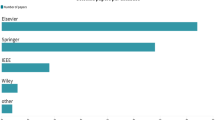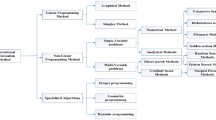Abstract
With the proliferation in the internet of things (IoT), a variety of delay sensitive applications have emerged over the past few years. Fog computing acts a viable computing paradigm for meeting the requirements of IoT applications. However, heterogeneous IoT tasks, resource constrained fog nodes makes task scheduling a challenging task. Efficient task scheduling reduces the computation cost, latency, energy and enhances the utilization of resources. In this paper, we propose the improved version of the meta-heuristic algorithm spider monkey optimization (SMO). We propose greedy task scheduling SMO (gTS-SMO) and semi-greedy task scheduling SMO (sgTS-SMO) for efficient task scheduling in fog computing environment. The main aim is minimize delay and energy consumption while considering the constraints of deadline and violation time. The system is evaluated based on the parameters of deadline violation time, makespan, energy consumption, total cost, and degree of imbalance. The results shows gTS-SMO reduces the violation time by 13.86%, 88.38% on comparison with sgTS-SMO and particle swarm optimization (PSO) respectively. The results also depicts the outperformance of gTS-SMO in terms of makespan and energy consumption. Makespan is reduced by 6.28%, and 57.75% and energy consumption by 5.74% and 53.65% on comparison with sgTS-SMO and PSO respectively.









Similar content being viewed by others
Availability of data and materials
Due to the nature of this research, participants of this study did not agree for their data to be shared publicly, so supporting data is not available.
References
Abidoye AP, Kabaso B (2021) Energy-efficient hierarchical routing in wireless sensor networks based on fog computing. EURASIP J Wirel Commun Netw 2021(1):1–26
Albadr MAA, Tiun S, Ayob M, Al-Dhief FT (2022) Particle swarm optimization-based extreme learning machine for covid-19 detection. Cognitive Computation, 1–16
Albadr MA, Tiun S, Ayob M, Al-Dhief F (2020) Genetic algorithm based on natural selection theory for optimization problems. Symmetry 12(11):1758
Albadr MAA, Tiun S, Ayob M, Al-Dhief FT, Omar K, Hamzah FA (2020) Optimised genetic algorithm-extreme learning machine approach for automatic covid-19 detection. PLoS ONE 15(12):0242899
Al-Dhief FT, Latiff NMA, Malik NNNA, Salim NS, Baki MM, Albadr MAA, Mohammed MA (2020) A survey of voice pathology surveillance systems based on internet of things and machine learning algorithms. IEEE Access 8:64514–64533
Baccarelli E, Naranjo PGV, Scarpiniti M, Shojafar M, Abawajy JH (2017) Fog of everything: Energy-efficient networked computing architectures, research challenges, and a case study. IEEE access 5:9882–9910
Bansal JC, Sharma H, Jadon SS, Clerc M (2014) Spider monkey optimization algorithm for numerical optimization. Memetic computing 6(1):31–47
Bitam S, Zeadally S, Mellouk A (2018) Fog computing job scheduling optimization based on bees swarm. Enterprise Information Systems 12(4):373–397
Bonomi F, Milito R, Zhu J, Addepalli S Fog computing and its role in the internet of things. In: Proceedings of the First Edition of the MCC Workshop on Mobile Cloud Computing, pp. 13–16 (2012)
Canali C, Lancellotti R (2019) Gasp: genetic algorithms for service placement in fog computing systems. Algorithms 12(10):201
Chen T, Giannakis GB (2018) Bandit convex optimization for scalable and dynamic iot management. IEEE Internet Things J 6(1):1276–1286
Ghanavati S, Abawajy JH, Izadi D (2020) An energy aware task scheduling model using ant-mating optimization in fog computing environment. IEEE Transactions on Services Computing
Hussein MK, Mousa MH (2020) Efficient task offloading for iot-based applications in fog computing using ant colony optimization. IEEE Access 8:37191–37201
Kalpana P, Nagendra Prabhu S, Polepally V, DB JR (2022) Exponentially-spider monkey optimization based allocation of resource in cloud. International Journal of Intelligent Systems 37(3), 2521–2542
Kherraf N, Sharafeddine S, Assi CM, Ghrayeb A (2019) Latency and reliability-aware workload assignment in iot networks with mobile edge clouds. IEEE Trans Netw Serv Manag 16(4):1435–1449
Kishor A, Chakarbarty C (2021) Task offloading in fog computing for using smart ant colony optimization. Wireless Personal Communications, 1–22
Kuppusamy P, Kumari NMJ, Alghamdi WY, Alyami H, Ramalingam R, Javed AR, Rashid M (2022) Job scheduling problem in fog-cloud-based environment using reinforced social spider optimization. Journal of Cloud Computing 11(1):99
Potu N, Jatoth C, Parvataneni P (2021) Optimizing resource scheduling based on extended particle swarm optimization in fog computing environments. Concurrency and Computation: Practice and Experience 33(23):6163
Rizvi N, Dharavath R, Edla DR (2021) Cost and makespan aware workflow scheduling in iaas clouds using hybrid spider monkey optimization. Simul Model Pract Theory 110:102328
Sami H, Mourad A (2020) Dynamic on-demand fog formation offering on-the-fly iot service deployment. IEEE Trans Netw Serv Manage 17(2):1026–1039
Seethalakshmi V, Govindasamy V, Akila V (2020) Hybrid gradient descent spider monkey optimization (hgdsmo) algorithm for efficient resource scheduling for big data processing in heterogenous environment. Journal of Big Data 7(1):1–25
Shah-Mansouri H, Wong VW (2018) Hierarchical fog-cloud computing for iot systems: A computation offloading game. IEEE Internet Things J 5(4):3246–3257
Shahryari O-K, Pedram H, Khajehvand V, TakhtFooladi MD (2021) Energy and task completion time trade-off for task offloading in fog-enabled iot networks. Pervasive Mob Comput 74:101395
Shamseddine H, Nizam J, Hammoud A, Mourad A, Otrok H, Harmanani H, Dziong Z (2020) A novel federated fog architecture embedding intelligent formation. IEEE Network 35(3):198–204
Wang Q, Chen S (2020) Latency-minimum offloading decision and resource allocation for fog-enabled internet of things networks. Transactions on Emerging Telecommunications Technologies 31(12):3880
Wang J, Li D (2019) Task scheduling based on a hybrid heuristic algorithm for smart production line with fog computing. Sensors 19(5):1023
Yadav AM, Tripathi KN, Sharma S (2021) A bi-objective task scheduling approach in fog computing using hybrid fireworks algorithm. The Journal of Supercomputing, 1–25
Zhang G, Shen F, Liu Z, Yang Y, Wang K, Zhou M-T (2018) Femto: Fair and energy-minimized task offloading for fog-enabled iot networks. IEEE Internet Things J 6(3):4388–4400
Acknowledgements
Not applicable
Funding
This work is not sponsored by anyone.
Author information
Authors and Affiliations
Contributions
SSH: Presented idea, writing, made simulations, shape the research, analysis and critical feedback. SAS: Involved in the supervision, contribution to final version of manuscript, and critical feedback.
Corresponding author
Ethics declarations
Conflict of interest
There is no conflict of interest
Ethics approval
Yes.
Consent to participate
Informed consent was obtained from all individual participants included in the study.
Consent for publication
The authors affirm that human research participants provided informed consent for publication manuscript.
Additional information
Publisher's Note
Springer Nature remains neutral with regard to jurisdictional claims in published maps and institutional affiliations.
Rights and permissions
Springer Nature or its licensor (e.g. a society or other partner) holds exclusive rights to this article under a publishing agreement with the author(s) or other rightsholder(s); author self-archiving of the accepted manuscript version of this article is solely governed by the terms of such publishing agreement and applicable law.
About this article
Cite this article
Hajam, S.S., Sofi, S.A. Resource management in fog computing using greedy and semi-greedy spider monkey optimization. Soft Comput 27, 18697–18707 (2023). https://doi.org/10.1007/s00500-023-09123-7
Accepted:
Published:
Issue Date:
DOI: https://doi.org/10.1007/s00500-023-09123-7




